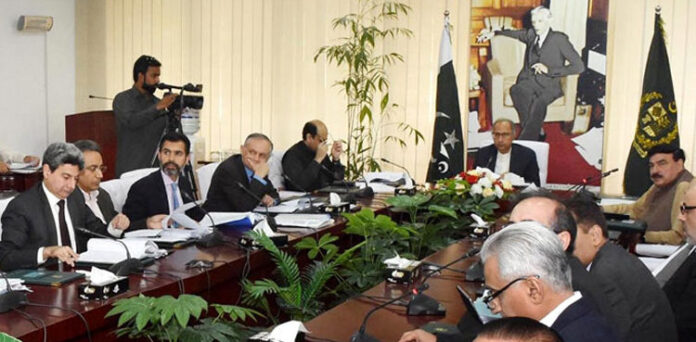- Gas prices for tandoors will be reverted back to the position of 30th June
- Committee okays imposition of 10pc regulatory duty on cotton import
ISLAMABAD: The Economic Coordination Committee (ECC) of the Cabinet Wednesday took up the issue of increased prices of roti and approved a proposal submitted by the Ministry of Energy to revise gas prices for tandoors with effect from Aug 1st in the larger interest of the general public.
The ECC, which met with Adviser to Prime Minister on Finance and Revenue Dr Abdul Hafeez Shaikh in the chair, decided to provide relief to the masses by reverting the gas prices for tandoors to the position of 30th June 2019.
The decision was taken despite the fact that price of wheat, which contributes 55 to 60pc to the price of roti, had remained unchanged while the gas bills that contribute 20 to 25pc to the price of roti had also not been issued yet under the new tariff came into effect from 1st July 2019.
As per the ECC decision, a detailed survey of the tandoors across the country would be carried out in order to ensure that the benefit of revision in gas tariff was made applicable to standalone tandoors or roadside restaurants and no undue benefit was passed on the tandoors in hotels or big restaurants that have commercial gas connections.
The ECC meeting also called for effective price control by provincial governments and urged the relevant authorities to ensure the sale of roti at its old price. It decided to review the decision after three months in case the tandoor owners failed to pass the benefit of reduced gas prices to the common man.
Meanwhile, a report on the country’s wheat situation was also presented to the ECC, as directed in the earlier meeting of the committee. The meeting was briefed that there were 7.635 million tonnes of wheat stocks available with Pakistan Agricultural Storage & Services Corporation (PASSCO) and provincial food departments.
It was further mentioned that after the imposition of the ban on the export of wheat and wheat flour, there has been a considerable reduction in wheat prices in the market and the situation would eventually reduce the prices of roti and naan in the market.
On a summary moved by the Ministry of National Food Security and Research, the committee decided to impose 10pc regulatory duty on the import of cotton.
The implementation of “Authorized Economic Operator Programme” (AEO), as envisaged under section 212 A (1) of the Customs Act, 1969, was also approved by the ECC.
Moreover, the ECC allowed the two LNG re-gasification terminals (Engro Elengy Terminal Private Limited and Pakistan Gas Port Consortium Limited) to allocate additional re-gasification capacity of terminal, if any, to third parties on a commercial basis under mutually agreed arrangements subject to certain conditions.
The ECC also approved the ‘Authorization of Central Power Purchasing Agency’ (CPPA) to sign an interim agreement regarding revised payment terms for LNG generation by Altern Energy Limited, Kot Addu Power Company Limited & public sector gencos.
The meeting was attended by National Food Security & Research Minister Sahibzada Muhammad Mehboob Sultan, Planning, Development & Reform Minister Makhdoom Khurso Bukhtiar, Maritime Affairs Minister Syed Ali Haider Zaidi, Privatization Minister Muhammadmian Soomro, Power Minister Omar Ayub Khan, Adviser to PM on Institutional Reforms and Austerity Dr Ishrat Hussain and Special Assistant to PM on Petroleum Nadeem Babar.





its a good news for common man…